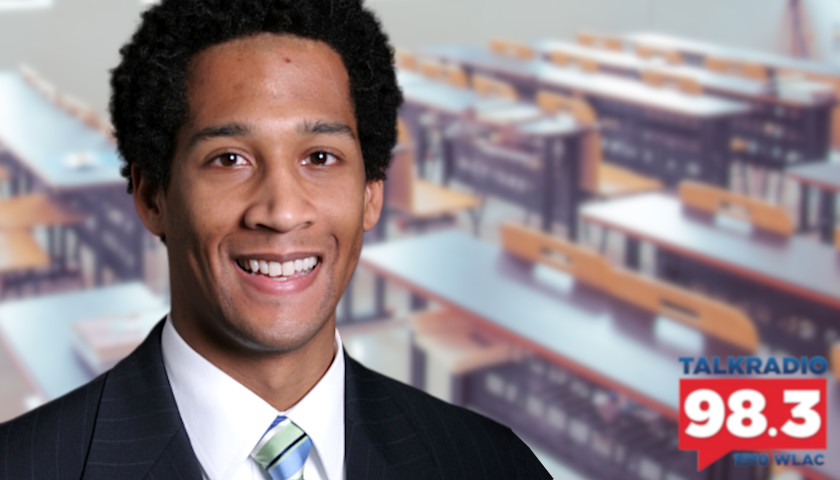On Friday’s Tennessee Star Report with Steve Gill and Michael Patrick Leahy – broadcast on Nashville’s Talk Radio 98.3 and 1510 WLAC weekdays from 5:00 am to 8:00 am – hosts Gill and Leahy welcomed Shaka Mitchell, Tennessee Director the American Federation for Children to the show to talk about the Gov. Lee’s education savings account legislation finally passing.
Towards the end of the segment, the men questioned whether or not the bill might face future litigation since the House and Senate had opposing views on the illegal alien aspect of the bill. The education savings account is expected to be signed immediately by Governor Bill Lee.
Gill: Teachers are apparently on a sick out in Davidson County today. Protesting that they’re not getting as big a pay raise as they would like. They want a ten percent pay raise instead of the three percent that Davidson County has apparently budgeted.
Well, see if that will help spur more people to leave the public schools where the results are bad and the teachers are demanding more pay with the Education Savings Account coming to Davidson County in a couple of years.
One of the guys that was behind that successful legislative push is Shaka Williams. He is the Tennessee Director of American Federation for Children. And Shaka is on our newsmakers line this morning. Shaka, good to have you with us.
Mitchell: Hey good morning. Thanks Steve and Michael.
Gill: A big win. And man it took some arm twisting. It took some butt kicking. Man ya’ll had to pull out all the stops to get this thing passed.
Mitchell: We did. You know it’s sometimes better to be lucky than good. I think we wre both.
Gill: When you look going forward you know a lot of the concerns that have been expressed about this education savings account plan, this voucher plan. It will not produce results and yet I know you guys have looked at other states where similar plans have been implemented and results have been produced. I think the opposition is not as concerned about whether results will not be produced. It’s that they will be produced and give more credence to this plan.
Mitchell: I think that’s absolutely right. We kept hearing in the debate they’d say, “Well this is called the pilot program but we know what’s going to happen and it’s would spread to other parts of the state.” You know, logic would say that if this is a pilot program and it spreads that’s because people demand it. People want it. And if people want it that’s absolutely what we should do. And if no one wants it then it’s not nearly as threatening as all the naysayers would have you believe.
Leahy: Shaka, here’s a question of fact about the final bill. I don’t know the answer to this. Will this voucher, education savings account program begin in fall of 2021 or the fall of 2022?
Mitchell: Well it must as per the legislation soon to be the statute it must start by the fall of 2021, however, it can start earlier and we are already working on the administration to move with urgency. We think kids can’t wait. Kids who are in schools that don’t work for them deserve a better option now. And so we’re working with them to start by the fall of twenty.
Leahy: Wow, that’s some breaking news.
Gill: Shaka Mitchell with us. Tennessee Director of the American Federation of Children. One of the issues that put the whole plan at risk late was the dispute over whether illegal alien children, children of illegal aliens should be included as being able to get the $7,300 vouchers.
You had the Senate wanting to specifically include them. You had the House wanting specifically to exclude them. This is almost certainly going to lead to litigation because the House forced their will that it would not include illegal alien children being able to get these vouchers. US Supreme Court has ruled essentially that they have to be included. This could lead to litigation. Will this delay or knee cap the program?
Mitchell: These programs are almost always challenged in court. They tend to be challenged by your national and state associations. Like your national teacher’s union. Sometimes your local and state teachers unions. But they’re also consistently upheld. And so, we got a long string of cases now where school choice programs have been found constitutional. I’m hopeful that that they keep provisions from this and will be too.
Gill: If in fact the court decides, look you’ve got to include the illegal aliens and they force that into the program. Will that kill the program or will they simply be able to essentially have the court force that provision out of the legislation and then allow illegal alien children to be in the system?
Mitchell: That’s a really good question and I think that sports betting just passed. So we may want to just put that…
Gill: What’s the over under?
(Laughter)
Leahy: Exactly.
Gill: There you go.
Mitchell: I’m not quite sure.
Gill: The thing that struck me about that whole issue was though that we have illegal alien children and illegal aliens in our school system now. We’re paying to educate them now because that’s the law. And we’re spending in Davidson County and Shelby County about $14-15,000 per pupil per year. We would actually be spending less on illegal alien children with the $7,300 voucher. I don’t know why people couldn’t get that?
Mitchell: Yeah, that’s true. You’re absolutely right about the finances. Look there was a lot about this bill that a lot of misinformation especially about the finances. And frankly, up until the last minutes we were in the Senate and had a fiscal report that was inaccurate. I think basically due to a type of player. It was a lot of misinformation out there. But you’re right. This would be less expensive than educating a child in a zoned government school.
Leahy: Back to the law as Steve mentioned. There’s a Supreme Court decision, Plyler, Department of Education that was reached in nineteen eighty, if I have that right that said, “Yep, illegal aliens must receive a public education.” And when Steve said that’s the law it’s a Supreme Court decision do I have that right?
Mitchell: You do have that right yeah.
Gill: And again we’re already having illegal alien students in our school so the idea that this legislation was going to make a difference about that struck me as very odd and again was part of the misinformation campaign that was being directed against it. The other late kind of push against it was the cost. When it was originally announced as plan, Governor Lee’s plan was going to cost about $225 million over the next four or five years.
The final cost even after you’ve diminished it to five different school districts to just two supposedly kicked up to $335 million. But some of that as I understand it is because the funding for rural schools has nothing to do with the voucher program it’s just increasing funding in some of the rural school districts.
Mitchell: Yeah that’s right. In a way maybe the best way to think about the law that just got passed is that you’ve got this education savings account on the one hand and that’s going to provide options up to fifteen thousand kids and then you have a separate school improvement grant program for struggling districts. And frankly, we should think of those as two separate things.
Gill: And yet they blended it together when they started screaming about how much this is going to cost and that the voucher program is going to cost us money. It’s like no, the voucher program is still going to cost what was originally estimated and still limited to fifteen thousand students maximum. But this other money is going to rural school districts that doesn’t depend on the voucher system.
Mitchell: Yeah that’s right. So by the way that means that schools (Chuckles) are going to in some cases have things like reduction in class size. And they are going to get more funds.
Gill: And legislators voted against this in those rural districts?
Mitchell: Yeah and some voted against this, I think it’s amazing that legislators against giving further support to struggling rural districts. To kids in our two biggest cities. Pretty non-sensical.
Gill: I mean Shaka I don’t know anything about politics (Leahy laughs). But it just seems to me that if I’m a legislator representing a rural district, somebody like me might come up with a pretty good mail piece to highlight the fact that Representative Smith voted against funding our schools. I mean maybe that will have an impact. I don’t know.
Mitchell: Yeah you might have a future in this thing.
(Laughter)
Gill: What is the timing Shaka, moving ahead? Again, Shaka Mitchell, the Director of the Tennessee American Federation for Children Organization. This goes now to the Governor. When do you expect him to sign it? I mean this is his primary project that he was interested in. When do you expect there to be a signing ceremony?
Mitchell: You know I haven’t received a date on that yet. I would expect that some point in the near future before June is the hope. And then we’ll start working with the administration on implementation. Our goal is, as fun as this whole political thing has been, our goal is to get kids into schools that work for them. So we will start immediately talking to families. Talking to schools. I’m already having discussions with schools so that they know what they need to do to participate and serve more kids.
Leahy: So the schools have to meet certain standards in order to receive the funding correct?
Mitchell: That’s right. Certain accreditation standards.
Leahy: Got it.
Mitchell: And you’ve heard some wild misinformation about that. But…
Gill: I can’t just go out and launch the School of Gill and start getting sponsoring?
(Leahy laughs)
Mitchell: Not yet.
Gill: We didn’t build that loophole into this whole thing apparently. (Leahy chuckles) Shaka thanks for being with us. Great job. Great heavy lift. Again, I think some legislators who voted against the Governor, voted against Donald Trump who was supporting this, and voted against funding the rural schools might have some political payback to come. We’ll see.
Leahy: Maybe.
Gill: I don’t know anything about this business.
Listen to the full hour on iHeart Radio:
– – –
Tune in weekdays from 5:00 – 8:00 am to The Tennessee Star Report with Steve Gill and Michael Patrick Leahy on Talk Radio 98.3 FM WLAC 1510. Listen online at iHeart Radio.
Photo “Shaka Mitchell” by Shaka Mitchell.





